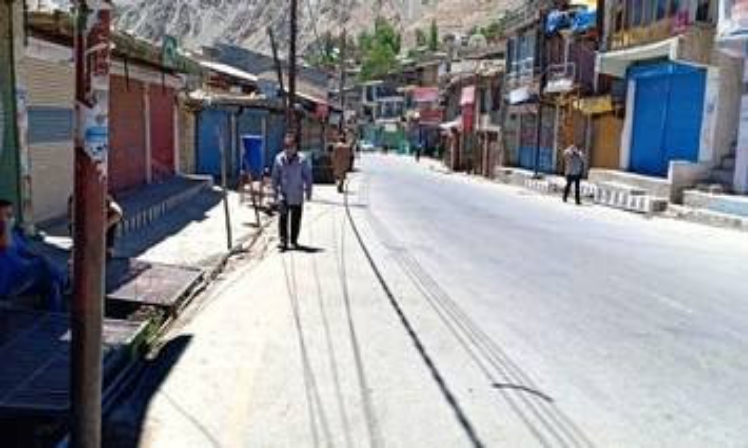
Image Source: Internet Photo
Ladakh left out in the cold 11 months after becoming a Union Territory
Leh | 26 July 2020
(Original Text: The Hindu)
Eleven months after it was carved out as a separate, administrative Union Territory (UT), the high-altitude desert region of Ladakh is at a crossroads, with minimal staff functioning from makeshift accommodation, no recruitment agency to fill gazetted posts, no formal bank and a dispute over its capital.
The challenge to ensure efficient administration in this high plateau located at an altitude of 9,800 feet can be gauged from the recent process to recruit doctors under the National Health Mission (NHM). Out of the 110 doctors recruited from across the country, including Gujarat, Rajasthan, Tamil Nadu, Andhra Pradesh and Uttar Pradesh, in April-May this year with a package up to ?2,50,000 per month, only 15 have opted to join so far.
�We have re-advertised these posts,� director, NHM Ladakh, Dr. Phuntsog Angchuk said.
Recruitment stalled
With demand growing for a separate recruitment agency on the lines of the Public Service Commission (PSC) in the UT of J&K, the Union Public Service Commission (UPSC) has balked at filling any gazetted post so far.
Ladakh saw the creation of over 400 posts after being declared a separate division within J&K prior to August 5, 2019. The number of vacant posts multiplied after it was declared a UT to around 5,000.
�Ladakh needs a PSC so that only locals are preferred for these jobs,� said Feroz Khan, chairman and chief executive councillor (CEC) of the Ladakh Autonomous Hill Development Council (LAHDC)-Kargil.
Staff from J&K
Over the past week, the J&K government administration has transferred over 118 officials on deputation to Ladakh to bring some semblance of normalcy in the understaffed departments including Education, Irrigation, Flood Control, Jal Shakti and Higher Education.
The transfers followed a letter from Umang Narula, adviser to the Lt. Governor. �The UT of Ladakh is facing serious constraints of manpower at various levels. Some directorates and heads of departments are headless, which is adversely affecting the delivery of public services (in Ladakh),� the letter reads.
As per the official records, many directors hold charge of as many as five departments, affecting the functioning. Many departments like Disaster Management exist only on paper.
But there is opposition to the deployment of staff from J&K.
�We face unemployment of trained and qualified youth in Ladakh. Instead of conducting a special drive to fill up the vacant positions, the officials here are requesting UT of J&K to depute staff,� said Sajad Kargili, who contested the 2019 parliamentary polls as an Independent candidate.
Since the implementation of the J&K Reorganisation Act in October last year, a cumbersome process of division of assets from banks to fans and sofas between the UTs has hit a dead end.
While the J&K Bank remains the official bank of J&K, the new J&K domicile law bars outsiders, including people from Ladakh, from applying for recently announced posts in the bank.
�The J&K Bank�s assets remain a common entity. Our youth should be allowed to sit for the test,� LAHDC-K chairman Mr. Khan said.
The J&K Bank has around two dozen branches in Ladakh and remains its largest bank with presence in the tough and remotest pockets of Leh and Kargil.
The clamour for domicile laws for Ladakh are growing now. Phuntsog Stobgyal, a BJP youth leader from Leh who met Member of Parliament Jamyang Tsering Namgyal and other senior officials over the issue recently, said, �Domicile laws for Ladakh are coming soon and will address these issues.�
Status of hill councils
The fate of both the councils, LAHDC-Kargil and LAHDC-Leh, that manage governance issues at the micro level with budgetary independence and also give representation to people, is also hanging fire.
�There is confusion in the minds of people because there is no formal order on demarcating the functioning of the hill councils by the Ministry of Home Affairs so far,� said Phunchok Stanzin, executive councillor of the LAHDC-Leh.
Mr. Khan said the absence of business rules has failed to delineate powers. �The council should be granted legislative powers on the lines of Bodoland Council to frame laws. Otherwise, the councils will be ineffective,� he said.
He pointed out that the interface between the public and the government through MLAs and MLCs has already come to an end as Ladakh is a UT without a legislature.
Dispute over capital
A recent notification naming Leh as the capital of the UT has reopened the debate over the claims of Kargil for the honour. Leh has a population of 1.33 lakh and Kargil 1.40 lakh. The claims of both districts are so vociferous that the UT administration has earmarked a budget for two offices of Raj Niwas.
�We will fight for Kargil as capital,� said Mr. Khan. However, Mr. Stanzin said Leh is the capital as the Lt. Governor functions from there.
Activist-turned-politician Mr. Kargili said it has been a year of �continuous administrative discrimination against Kargil�. �Leh has announced a list of Class IV appointments and Kargil has been left out. Despite all odds, we will always voice for restoration of statehood,� he added.
Leave a comment: (Your email will not be published)